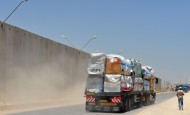NGOs, Humanitarian Aid, and Hamas Connections
This past week two humanitarian workers in Gaza were indicted, for allegedly diverting aid to Hamas.
According to the charges, the manager of the NGO World Vision’s Gaza operations, Mohammed El-Halabi, funneled 60% of the organization’s Gaza budget to Hamas. Waheed Borsh, a United Nations Development Programme (UNDP) employee since 2003, has been indicted with providing material assistance to Hamas and using his position to aid the terrorist group. Save the Children was also mentioned in the context of these allegations.
NGO Monitor identified World Vision and the UNDP as susceptible to aid diversion in its 2015 book, Filling in the Blanks, concluding that there is “little doubt as to World Vision’s willingness to negotiate and coordinate with armed groups. This raises questions as to whether the group would prevent components of its aid from being misappropriated by terrorist organizations, if it felt that taking a stand would jeopardize the organization’s ability to continue its operations in a given area.” NGO Monitor also noted the UNDP’s complicity in strengthening and enhancing the legitimacy of Hamas in UNDP’s 2012-2014 “Consolidated Plan of Assistance,” and raised concerns over possible cooperation between UNDP and Hamas institutions.
As NGO Monitor has warned repeatedly, humanitarian efforts in warzones are inherently susceptible to extortion and theft by violent actors, including terrorist organizations. In particular, Hamas has a history of raiding aid warehouses and convoys as well as developing tax schemes designed to skim money off of international largesse. UN Gaza aid mechanisms similarly suffer from corruption, compromising the integrity of imported materials. Any consideration of humanitarian projects in Gaza must, therefore, include vigorous, concrete, and effective policies that address the risk of aid diversion, both on the part of the implementing organization and on the part of the funder.
For further information on these issues see:


